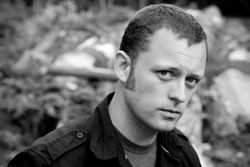|
Most writers are conservative. By that I mean they lock their best ideas in a vault and take pleasure in the richness of their stores, like misers with their money. Maybe you have moleskins full of hastily scribbled notes. Or a corkboard next to your desk messy with images, structural blueprints, articles ripped from magazines. Or at the very least a folder on your computer labeled Stuff.
For every story or essay or poem you write, you withdraw one image, two characters, maybe three of the metaphors you have stockpiled—and then slam shut the vault and lock it with a key shaped like a skeleton's finger.
I used to be the same way, nervously rationing out my ideas.
Tony Early (the author of Jim the Boy) cured me of that. Years ago, I was talking to him about his story, one of my favorite stories, "The Prophet from Jupiter." He said that he put everything he had into it. "I was tired of holding back," he said. His stories up to that point, he felt, had been good. But he wanted to write something truly great, an earth-shaker. So he put every last drop of himself, all of his best material, into a single story.
And it worked. "Prophet" appeared in Harper's, scored a National Magazine Award, and to this day is widely taught and anthologized.
There was a price. After he finished the story, he lay on the couch feeling emptied, carved-out, certain he would never write anything again. This lasted for two weeks. And then the well filled back up.
I decided to follow Tony's advice. I put all my chips on the table. I went all in.
The story "Refresh, Refresh" was a game-changer for me, not only because of its success, but because it changed my approach to writing. Now I never hold back. I dynamite the vault and let all my treasure pour out. Every story is an "all in" story.
Though I at first experienced the same vacancy as Tony—the feeling, upon finishing something, that I would never write again—my imagination soon trained itself to recover speedily. And I became like Larry Watson (author of Montana 1948), who once told me that when writing a novel, he can drive to the mall or walk along the lakeshore and say, "I'll take that and I'll take that and I'll take that," discovering new material that immediately makes its way onto the page.
The writer is always a careful observer, but if you are constantly evacuating your imagination, your eyes and ears grow even sharper and you lean forward with hunger for every experience, knowing that it will offer up a card to add to your hand.
This is, after all, a gambler's trade. All in. Always.
| 

